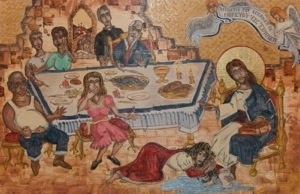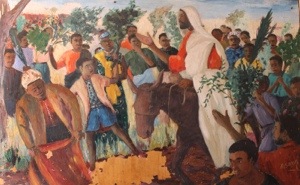“This Woman: Shame, Society and the Savior” Luke 7:36-50
Sermon Summary. It is an unfortunate irony that during women’s month at Progressive, that visible acts of violence against women seem to be on the rise locally, nationally, and even across the globe. Milwaukee’s reputation regarding human sex trafficking, the violent murder of six in California, three women shot at in California for refusing to have sex, and the kidnapping of 300 Nigerian girls and the routine raping of women are just a few notorious examples. When we treat people with labels and like objects it creates an environment that is directly the opposite of what God intends for his highest creation. We see that reality in this biblical narrative. The “sinful woman” is known in society only by her label and her baggage of shame. Left to society and the Pharisee, there would be no place for “this woman” inside God’s church. At the precise moment when “this woman” is experiencing the most profound, life altering, God/human encounter, the Pharisee is more focused on her past.
Thankfully, Christ’s love for us is so vast that he looks beyond our sin and shame and hears the cries of our hearts. Because this woman was bold enough to focus on Jesus and not what society said about her, she came to him with her heart. Her sins were forgiven and she was saved. We must bring all of our baggage to the Lord in the same way and experience his forgiveness and his salvation. We must not do spiritual violence to others in the way this Pharisee was prepared to do to “this woman.”
Backstory (v36-37). The story of the bible is the continuing intersection and intervening of God in the life of man. God makes himself available in the lives of His people and our circumstances. That is what we see building in these verses, Jesus is available at a time of need in the life of “this woman.”
- Is Jesus in the temple in this narrative? How is his ministry on the move?
- Even though Jesus knows the Pharisees “have issues,” he still reclines at their table? What does that mean for ministry?
- We are introduced to this woman in the text. How is she known? What does it mean to be known by our baggage?
- What did she learn about and what did she do? How can we apply this to our lives?
God/Human Encounter (v38). The history of the Christian journey is the continuing narrative of our human encounters with the living God. When we read the Bible, we should slow down and pay close attention to the real interaction between God and his people. Consider this woman who has brought her heart and her baggage to her savior.
- This woman prepared to worship and made her way to Christ. What do we allow to get between us and our worship?
- What do we see that shows the depth of emotion she experienced when she was with Christ?
- What do we see that showed the depth of her worship of Christ?
- Are we able to be open in our worship of Lord in the same way? Why or why not?
The Tragic Mind of Man (v39). This woman is baring her soul with raw emotion and worship before Christ. It is a profound tragedy that the host, the Pharisee, is so self absorbed and judgmental that he misses the whole God/human encounter. In one quick moment, he – like much of society – appoints himself a judge. He judges the woman AND he judge Christ. And, he misses the wonder of God.
- Do we wonder about the sincerity of the Pharisee’s invitation? How are our motivations with others?
- How do we see that the Pharisee judge’s Christ? What is he judging? Do we do this?
- How does he judge the woman?
- Why do we think he missed the significance of the interaction between Christ and the woman?
Authentic Relationship (v40-47). 1 Samuel 16:7 tells us that “man looks at the outward appearance, but the Lord looks at the heart.” Perhaps never more true than in this text. By title, we have a man of stature – the Pharisee. And, we have a person of shame/scorn – the “sinful woman.” But which of these two has true, authentic relationship with the Lord (consider that in the parable both of them are “debtors” . . . They are both sinners)?
- The customs of basic hospitality at that time were that a guest would receive water to clean his feet and to greet with a kiss. Did the Pharisee, who was learned and a man of stature, provide basic hospitality to Christ? Does he appear sincere about receiving Christ?
- In contrast, look at “this woman” who the Pharisee judged. How authentic is her experience with Christ?
- Would we receive the Pharisee differently than “the sinful woman?” What does 1 Samuel 16:7 say?
Forgiven and Saved (v48-50). Here is the essence of the Gospel. This woman came to Christ with tears in her heart about her circumstance. Jesus did not stand as a condemning God. But, he sat in close proximity as a loving God ready to receive her. She did not say a word but he saw the condition of her heart. He moved beyond her faults and her baggage and spoke to her needs. If left to the Pharisee, this woman might not have experienced Christ. But, thankfully she kept her mind and spirit focussed on him. She was liberated from her sin and her shame by the savior. We must do the same. Whatever holds us back, God desires to remove that baggage, to forgive us, to liberate us and to have us go in peace.


Great word. Looks like we are all in the same vein.
Amen Pastor Moore!